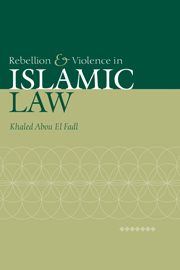Book contents
- Frontmatter
- Contents
- Preface and acknowledgments
- Introduction
- 1 Modern scholarship and reorienting the approach to rebellion
- 2 The doctrinal foundations of the laws of rebellion
- 3 The historical context and the creative response
- 4 The rise of the juristic discourse on rebellion: fragmentation
- 5 The spread of the Islamic law of rebellion from the fourth/tenth to the fifth/eleventh centuries
- 6 Rebellion, insurgency, and brigandage: the developed positions and the emergence of trends
- 7 The developed non-Sunnī positions
- 8 Negotiating rebellion in Islamic law
- Works cited
- Index of names
- Index of subjects
Introduction
Published online by Cambridge University Press: 15 December 2009
- Frontmatter
- Contents
- Preface and acknowledgments
- Introduction
- 1 Modern scholarship and reorienting the approach to rebellion
- 2 The doctrinal foundations of the laws of rebellion
- 3 The historical context and the creative response
- 4 The rise of the juristic discourse on rebellion: fragmentation
- 5 The spread of the Islamic law of rebellion from the fourth/tenth to the fifth/eleventh centuries
- 6 Rebellion, insurgency, and brigandage: the developed positions and the emergence of trends
- 7 The developed non-Sunnī positions
- 8 Negotiating rebellion in Islamic law
- Works cited
- Index of names
- Index of subjects
Summary
DISCOURSING ON REBELLION
One of the most important issues confronting Islamic law today is how to balance the obligation to obey God against the fact that God's will is represented by human beings. In Islamic thought, God is the authoritative source of law, but what is the balance between God's authoritativeness and the potential for human authoritarianism? From an institutional and social point of view, God's will could be represented by a variety of political or social realities including an absolute ruler, a court, a body of clergy, an ingrained bureaucracy, a well-established social practice, or even the unchallenged assertions of the head of a household. From a doctrinal and, perhaps, dogmatic perspective, God's will is represented primarily by the ruler and jurists who are considered God's special agents on the earth. While Muslims in general, arguably, are God's viceroys on this earth (khulafāʾ fī al-arḍ), it is rulers and jurists who traditionally have enjoyed the power to speak for the divine law. Doctrinally, both rulers and jurists, to different extents, are empowered to construct and represent the divine will in Islam. This creates a dichotomy between the roles, interests, and aims of rulers and Muslim jurists. Inherent to this dichotomy is an implicit form of negotiation – a power sharing or, at times, competition.
The negotiative dynamic between rulers and jurists in Islamic history has produced a complex and rich doctrinal discourse which, at least as understood and constructed by the juristic culture, has been recorded in Islamic legal sources.
- Type
- Chapter
- Information
- Rebellion and Violence in Islamic Law , pp. 1 - 7Publisher: Cambridge University PressPrint publication year: 2001

